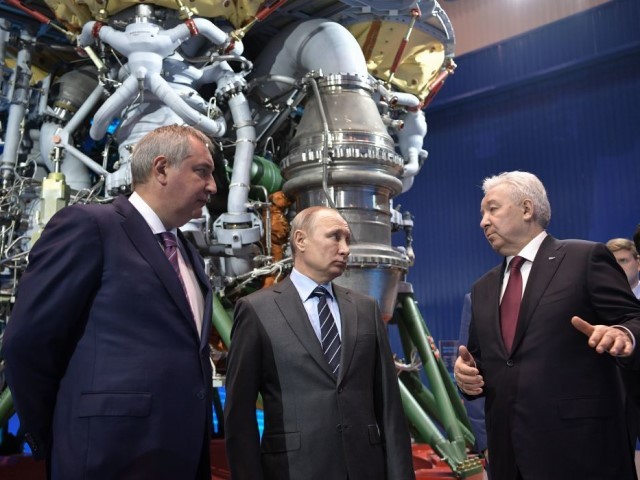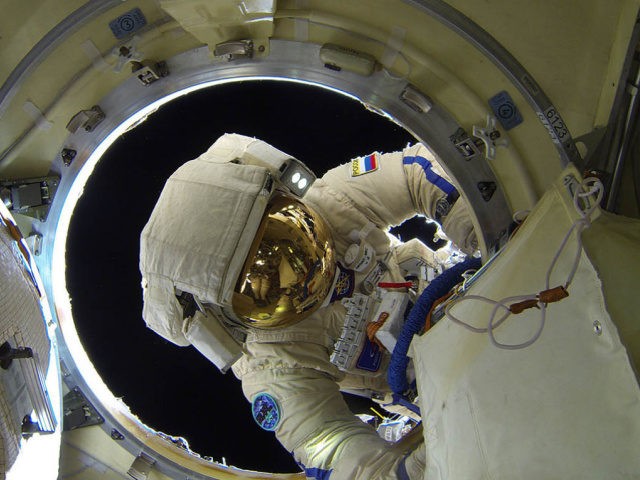Dmitry Rogozin, director of the Russian space agency Roscosmos, said on Friday that he will pitch a joint project for a moon landing to his counterparts in China next month.
“Before the end of May, I plan to hold detailed dialogue with our Chinese colleagues on our cooperation in this direction,” Rogozin told Russia’s state-run Tass news agency.
Tass noted Roscosmos signed a cooperation agreement with the Chinese National Space Administration (CNSA) in 2017 that called for the two authoritarian nations to work together on lunar research, in addition to other space projects.
Rogozin signed a memorandum of understanding with CNSA director Zhang Kejian to work toward building a base on the moon.

Russian President Vladimir Putin (C) and the State space corporation Roscosmos head Dmitry Rogozin (L) listen to Director of Russian rocket engine manufacturer NPO Energomash Igor Arbuzov in Khimki, outside Moscow on April 12, 2019. (Photo by ALEXEY NIKOLSKY/SPUTNIK/AFP via Getty Images)
Russia has, unsurprisingly, moved away from cooperation with the U.S. and European space agencies and closer to China since the Russian invasion of Ukraine. Rogozin, a combative Russian nationalist and close ally of dictator Vladimir Putin, is the point man for Russia’s disengagement from the international space community.
Rogozin told a Chinese interviewer in March that European sanctions against Russia have ruined the chances for further joint projects in space.
“At this moment, after the European Space Agency and the whole European Union have taken a frenzied position on the conduct of (Russia’s) special military operation in Ukraine and introduced sanctions against Roscosmos, we consider further cooperation impossible,” Rogozin said, using Putin’s preferred euphemism for the savage Russian attack on Ukraine.
Rogozin said cooperation with Europe could only resume if the Europeans acknowledge “what they’ve destroyed with their own hands” and ask Moscow to forgive them.
In early April, Rogozin issued the latest in a string of threats to pull Russia out of the International Space Station (ISS) program.
“The purpose of the sanctions is to kill the Russian economy, plunge our people into despair and hunger and bring our country to its knees,” he railed.
“I believe that the restoration of normal relations between partners in the International Space Station and other joint projects is possible only with the complete and unconditional lifting of illegal sanctions,” he said.
Russia and China have boasted of working together on lunar exploration and building a moon base for over a year. Foreign observers question their ability to make good on these boasts, citing the immense cost, formidable technical obstacles, and the shifting power dynamics between Beijing and Moscow.
To put it bluntly, China has far more money to spend and better technology, and Russia is chronically behind schedule on its contributions to space projects, but Russia is unlikely to settle for a humiliating sidekick role in prestigious lunar exploration.
Other nations and private companies have been slow to accept Russian and Chinese invitations to join in the moon base project, and the Chinese admitted last summer they are at least a decade away from sending astronauts to the Moon.
“I’m pretty sure there’s probably a 0 percent chance of this being successful. They don’t have any money. You know, it’s expensive,” former astronaut and ISS Commander Scott Kelly said of Russia’s lunar agenda on Wednesday.
“They also are not that sophisticated as a spacefaring nation,” Kelly continued. “I mean, they’ve got one thing that works well that can launch three people into space and bring them home pretty reliably … that’s about it.”
“The future of their space program, as a result of Putin’s invasion of Ukraine, is pretty bleak,” he concluded, holding out hope that Russia would continue participating in the ISS program despite Rogozin’s threat to pull out.

COMMENTS
Please let us know if you're having issues with commenting.